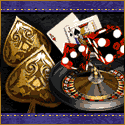
| The biggest online gambling site on the Internet! |

|

Casino Game Guides:
Blackjack is one of the oldest and most popular casino games there is. It’s
popularity may be due to the fact that it is one of the few casino games
in which skill can dramatically improve a players odds. Originating from
French card games in the 1800s, blackjack found popularity in the American
west. Once gambling was legalized in Nevada in the 1930s, blackjack became
of staple of the casino circuit. |
||||||||||||||||||||||||||||||||||||||||||||||||||||||||||||||||||||||||||||||||||||||||||||||||||||||||||||||||||||||||||||||||||||||||||||||||||||||||
Dealer's Up Card |
||||||||||
| 2 | 3 | 4 | 5 | 6 | 7 | 8 | 9 | T | A | |
| A,9 | S | S | S | S | S | S | S | S | S | S |
| A,8 | S | S | S | S | S | S | S | S | S | S |
| A,7 | S | DS | DS | DS | DS | S | H | H | H | H |
| A,6 | H | D | D | D | D | H | H | H | H | H |
| A,5 | H | H | D | D | D | H | H | H | H | H |
| A,4 | H | H | D | D | D | H | H | H | H | H |
| A,3 | H | H | H | D | D | H | H | H | H | H |
| A,2 | H | H | H | D | D | H | H | H | H | H |
DS=double down if possible or stand
Betting Strategy
Knowing when to hit and stand is just the beginning. Knowing when and how much to bet will make the difference between taking a limo home or taking a taxi home.One old and well known system is the “Martingale” system. The theory is simple. Start with a single bet. If you win bet the same amount again. If you lose, double your previous bet. The idea is that eventually you are bound to win. The problem with this system is that bets get very large very quickly. You’ll need a very large bankroll and the table’s maximum bet will stop your system in its tracks.
Many people increase their bets when they are on a winning streak. Many increase their bet when they are on a losing streak, thinking they are due for a win or trying to recover losses. The cold hard truth is that none of these strategies work without knowing what cards are coming next and to do this you’ll need to count cards.
Counting Cards
This is a sure fire way to reduce the house odds and give the player a much higher advantage. The basic premise involves assigning a value to a type of card and keep a running tally of the total value.A common card counting technique assigns a +1 to a 2,3,4,5 and 6. -1 to 10, jack, queen king and ace and 7, 8, 9 get 0. As cards are played an discarded keep a running total of their values. If the count is positive, then there are a higher number of high value cards left in the deck, which is good for the player. This is your cue to start increasing your bets. What tips the odds in favor of the player is that blackjacks pay 3 to 2 and can substantially increase your winnings.
Card counters will usually look for London Deal games (games in which the cards are dealt face up) and will try to get into the “third base” seat. From here the player sees all cards that have come before him and is in more control over the fate of all the players at the table.
Odds
To play blackjack well, there are a number of rules and situations which you should be aware of that will affect the odds a any game of blackjack. Below is a sample of some of these and the resulting effect of player odds.| Rule | Effect on Player Expectation |
| Two decks | -0.32% |
| Four decks | -0.48% |
| Six decks | -0.54% |
| Eight decks | -0.58% |
| Dealer hits soft 17 | -0.20% |
| Double down only on 11 (no soft, no 10, no 9, no 8) | -0.78% |
| Double down only on 10 or 11 (no soft, no 9, no 8) | -0.26% |
| Double down only on 9, 10, 11 (no soft, no 8) | -0.14% |
| No re-splitting of any pairs | -0.03% |
| Dealer wins ties | -9.00% |
| Natural pays 1 to 1 | -2.32% |
| Natural pays 2 to 1 | +2.32% |
| Double down on any number of cards | +0.24% |
| Double down after splitting pairs | +0.14% |
| Late surrender | +0.06% |
| Early surrender | +0.62% |
| Six-card winner | +0.15% |
| Players 21 pushes dealer's 10-up Blackjack | +0.16% |
| Re-splitting of aces | +0.06% |
| Draw to split aces | +0.14% |


